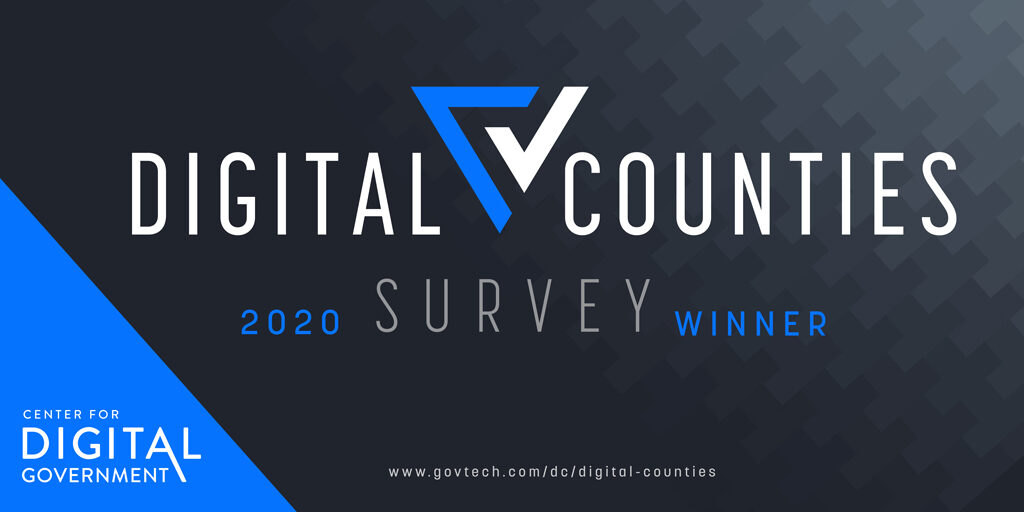2020 Digital Counties Survey Recognizes Leaders in Use of Advanced Analytics, Digital Equity Initiatives, and COVID-19 Response; and Announces the 2020 Future Ready Award Winner
Center for Digital Government survey commends counties that deploy technology practices for social betterment.
 SACRAMENTO — The Center for Digital Government (CDG) and the National Association of Counties (NACo) announced the winners of the 18th annual Digital Counties Survey. The survey, conducted by CDG in partnership with NACo, identifies the best technology practices among U.S. counties, including initiatives that streamline delivery of government services, encourage open data, collaboration and shared services, enhance cybersecurity and contribute to disaster response and recovery efforts.
SACRAMENTO — The Center for Digital Government (CDG) and the National Association of Counties (NACo) announced the winners of the 18th annual Digital Counties Survey. The survey, conducted by CDG in partnership with NACo, identifies the best technology practices among U.S. counties, including initiatives that streamline delivery of government services, encourage open data, collaboration and shared services, enhance cybersecurity and contribute to disaster response and recovery efforts.
“Innovative counties are utilizing technology and data to better serve their citizens, respond quickly to citizen needs around COVID-19, and support digital experience initiatives,” said Phil Bertolini, co- director, CDG. “The Center for Digital Government congratulates this year’s winners for their hard work and their efforts to use technology to make government better.”
“We applaud this year’s Digital Counties Survey winners for maximizing the benefits of technology in serving our residents, especially during a time when technology has become even more instrumental in connecting people and places,” said NACo Executive Director Matthew Chase. “The Digital Counties Survey demonstrates how we embrace cutting-edge approaches to strengthening our communities and achieving healthy, safe and vibrant counties across America.”
This year’s first-place winners include:
? County of Ventura, Calif. (500,000 – 999,999 population category):
Ventura County made network upgrades to support its COVID-19 response on short notice. In addition, the county created partnerships to provide telemedicine to citizens, and the county’s Lean Six Sigma program and STEM for young women program have become county best practices.
? County of Los Angeles, Calif. (1,000,000 or more population category):
Los Angeles County successfully aligned leadership and IT programs. All department IT budget requests are aligned to the county’s five IT strategic goals, which are aligned to overall county goals. The county also established key performance indicators (KPIs) via collaboration with 12 departments in the Justice Metrics Framework. The KPIs combined with advanced analytics provide insights into which programs and services reduce involvement of vulnerable populations in the justice system.
? Chesterfield County, Va. (250,000-499,999 population category):
Chesterfield County handled sudden work-from-home orders well in part due to its 10-year technology modernization plan and enterprise approach to data-driven government. For example, the county created the “StratIS” (Strategic Information Sharing) data program. In addition, the county’s chatbot, “ChesterBot,” helped the county manage a sudden surge in phone call volume during the pandemic’s initial stages.
? Arlington County, Va. (150,000-249,999 population category):
Arlington County’s digital equity program is a national model. The county provides digital connections for the most disadvantaged populations, and offers education, training, and programs to enable residents to take full advantage of available resources. For example, libraries and other county facilities offer outdoor, drive-up digital hot spots.
? County of Mono, Calif. (up to 150,000 population category):
County IT leads a task force for GIS, web, network, and other technology resources. The county created a COVID-19 response app to effectively communicate with the public during the pandemic. Response to dozens of cybersecurity threats each week is also excellent – the county has had no significant security issues in the last two years. In addition, the county has achieved off-site redundancy in data centers that are 60 miles apart.
The Center for Digital Government thanks the underwriters of this year’s survey: Akamai, Amazon Web Services, Crown Castle, EasyVote Solutions, Google Cloud, Laserfiche, Medallia Inc., Oracle, SHI, Spectrum Enterprise, TeamDynamix, and Tyler Technologies.
For the full list of winners, CLICK HERE.
FUTURE READY AWARD 2020: The Future Ready Award, sponsored by Google Cloud, is presented to jurisdictions that are laying the foundation for the disruptive and converging forces that are shaping an uncertain future — through technology or process changes; innovation; engagement with partners; and by harnessing emerging technologies to solve problems.
CDG presented the Future Ready award to the County of Los Angeles, Calif. The county’s future-ready accomplishments include: establishment of a $10 million Information Technology Fund for innovative technology or multi-department solutions; development of an Enterprise IT Strategic Plan with over 200 business and IT professionals from 37 county departments; establishment of a $20 million Legacy Modernization Fund to modernize mission critical systems; and the use of artificial intelligence and machine learning to predict homelessness among adults receiving county services.
About the Center for Digital Government:
The Center for Digital Government is a national research and advisory institute focused on technology policy and best practices in state and local government. CDG is a division of e.Republic, the nation’s only media and research company focused exclusively on state and local government and education.
About NACO: The National Association of Counties (NACo) strengthens America’s counties, including nearly 40,000 county elected officials and 3.6 million county employees. Founded in 1935, NACo unites county officials to advocate for county government priorities in federal policymaking; promote exemplary county policies and practices; nurture leadership skills and expand knowledge networks; optimize county and taxpayer resources and cost savings; and enrich the public’s understanding of county government.
